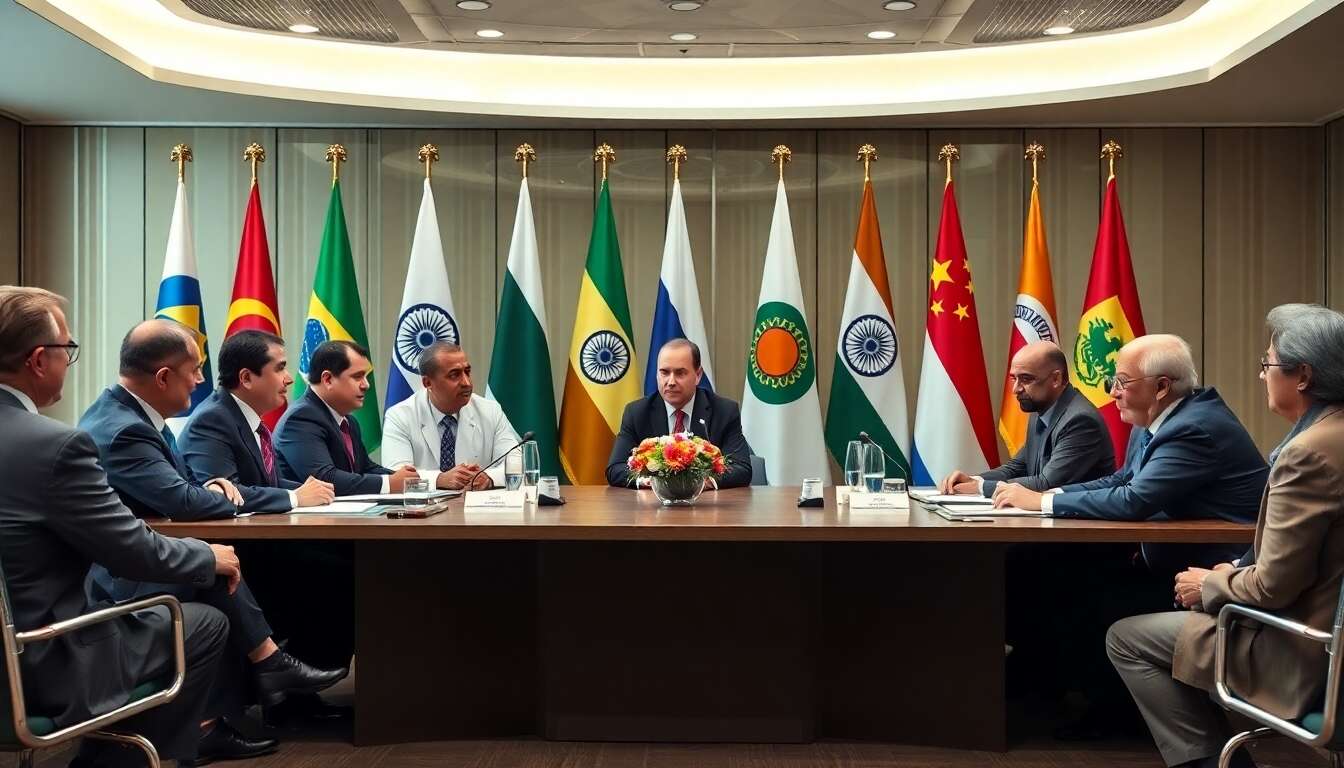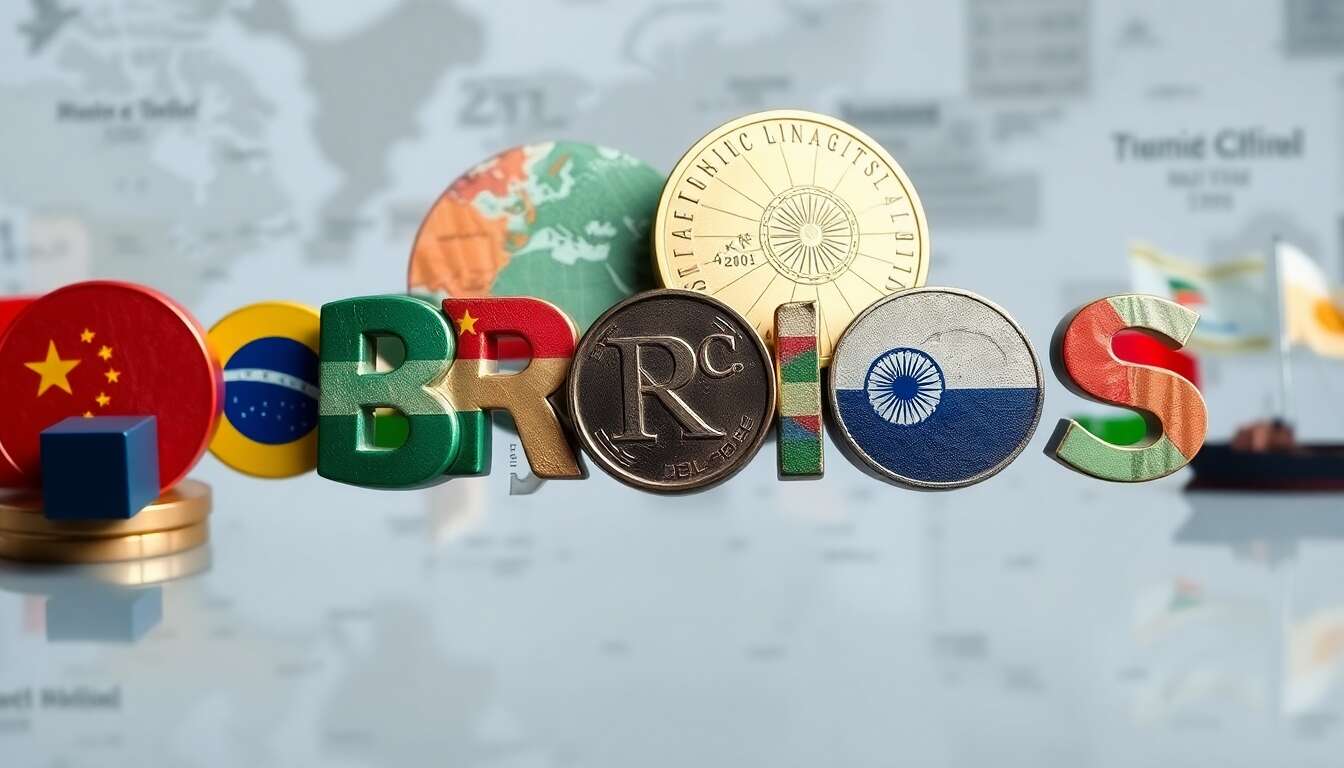The BRICS group, consisting of Brazil, Russia, India, China, and South Africa, has recently expanded to include Argentina, Egypt, Ethiopia, Iran, Saudi Arabia, and the UAE. This expansion marks a pivotal moment for the bloc, which aims to challenge the dominance of the US dollar in global trade. The following sections explore the reasons behind the burgeoning interest in a BRICS currency.
Expansion of BRICS: A New Economic Dynamic

Shifting Economic Power
The expansion of BRICS has shifted the economic power balance on the global stage. By welcoming new members, the group enhances its economic influence and cements its position as a formidable counterweight to Western economic structures. This expansion significantly impacts global trade dynamics and financial markets.
Geopolitical Significance
The geopolitical ramifications of BRICS’ expansion are profound. With diverse economic and political systems, the new members bring various perspectives and resources, strengthening the bloc’s strategic autonomy and bargaining power in international forums.
Table of Economic Contributions
| Country | GDP Contribution (%) |
|---|---|
| Original BRICS | 30 |
| New Members | 10 |
The newly expanded BRICS group sets the stage for discussions about economic and strategic cohesion as they move forward with a united vision.
The New BRICS Members: Challenges and Opportunities
Diverse Economies
The addition of diverse economies offers both challenges and opportunities for BRICS. Members such as Saudi Arabia and the UAE bring significant energy resources, while countries like Ethiopia and Argentina contribute agricultural potential.
Collaborative Prospects
This diversification enhances the group’s ability to negotiate global trade terms. These new partnerships promise to foster collaborative policies that can benefit both new and original members.
Envisioned Economic Initiatives
- Joint infrastructure projects
- Strategic trade agreements
- Shared innovation hubs
Understanding the potential for collaboration among new and existing members is crucial as BRICS explores further integration of economic and diplomatic strategies.
Why the BRICS Currency is Gaining Traction

Challenging Dollar Dependency
The demand for a unified BRICS currency is driven by the desire to reduce dependency on the US dollar. This is becoming increasingly relevant as members seek to assert greater control over their economic futures.
Financial Autonomy
By establishing their currency, BRICS nations aim to achieve financial sovereignty and mitigate the risks associated with currency exchange fluctuations. This autonomy also allows for tailored monetary policies that align with the specific needs of member nations.
Growing Influence
The influence of BRICS nations continues to grow as they assert their presence in global markets. This influence is partly due to the group’s growing area of engagement and strategic alliances.
The momentum for a BRICS currency sets the stage for analyzing its broader implications, especially concerning existing currencies like the US dollar.
Impact of the Expansion of BRICS on the US Dollar
Shifting Trade Dynamics
The expansion of BRICS, coupled with the potential introduction of its currency, is poised to alter trade dynamics traditionally dominated by the US dollar. This shift could challenge the currency’s long-standing status as the primary medium of exchange.
Investor Confidence
As BRICS nations explore avenues to enhance their economic sovereignty, investor confidence may also shift. The establishment of an alternative currency could attract speculative interest away from the dollar, influencing financial markets worldwide.
Financial Preparedness
Maintaining financial preparedness will be critical for nations relying heavily on the dollar. The introduction of a new currency could encourage diversification in currency reserves and investment strategies.
Exploring the de-dollarization strategy unveils strategic maneuvers within BRICS, enhancing its collective bargaining power globally.
De-Dollarization: The Strategic Role of BRICS
Navigating Economic Independence
De-dollarization represents a strategic effort by BRICS to achieve economic independence. Members are increasingly conducting transactions in local currencies, reducing transactional reliance on the US dollar.
Policy Implications
Implementing de-dollarization policies requires careful consideration of existing trade agreements and partnerships. Members must navigate existing relationships while transitioning towards a system that favors a multipolar currency landscape.
Economic Stability
Stability in emerging economies is more achievable through de-dollarization. By minimizing external dependencies, BRICS nations can foster sustainable growth and development.
The lessons learned from initiatives like the euro are pivotal in guiding BRICS toward further establishing monetary cohesion.
Towards a Common Currency: Lessons from the Euro
European Union’s Experience
In developing a BRICS currency, essential lessons can be drawn from the euro’s implementation. The euro demonstrated the complexities of merging diverse economies under a single monetary framework.
Challenges and Opportunities
Challenges such as economic disparity and varying fiscal policies will need careful management. However, a common currency offers opportunities for trade facilitation and economic integration among member states.
Essential Strategies
- Coordinated fiscal policies
- Robust legal frameworks
- Comprehensive economic assessments
Learning from the euro’s trajectory can refine BRICS’ approach as they aspire to optimize their influence on global commerce.
BRICS and Global Trade: Growing Influence

Global Marketplace Dynamics
BRICS’ economic clout continues to influence global trade due to collaborative efforts in various sectors. Their collective voice can reshape trade policies, ensuring that emerging economies’ interests are considered.
Strategic Trade Policies
Through strategic alliances and trade agreements, BRICS nations are positioned to wield significant influence in global markets. These policies aim to promote sustainable trade practices that benefit member countries.
Innovative Trade Mechanisms
- Alternative payment systems
- Technology-driven trade facilitation
- logistics and supply chain reforms
This growing influence positions BRICS as a key player in a multipolar world, heralding a new era for its economic prospects and global alliances.
The Future of BRICS in a Multipolar World
Strategic Alliances and Partnerships
BRICS is making concerted efforts to establish strategic alliances that extend beyond its immediate members. By engaging with other emerging markets and developing regions, the group seeks to fortify its position as a pillar of multipolarity.
Geopolitical Ramifications
As the balance of power shifts, BRICS’ role within a multipolar framework becomes pivotal. The transition towards a collaborative and cohesive global environment depends on enhanced diplomatic and economic relations.
Future Prospects
The potential for BRICS to redefine international relations presents numerous prospects for growth and stability. By committing to shared goals and values, BRICS members can champion a balanced approach to global governance.
As BRICS continues to grow and adapt, its impact on international markets will become increasingly significant. The group’s strategic initiatives highlight its potential as a transformative force in reshaping the global economic landscape.



